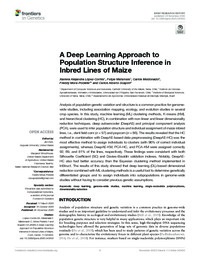Mostrar el registro sencillo de la publicación
A deep learning approach to population structure inference in inbred lines of maize
| dc.contributor.author | López-Cortés, Xaviera A. | |
| dc.contributor.author | Matamala, Felipe | |
| dc.contributor.author | Maldonado, Carlos | |
| dc.contributor.author | Mora-Poblete, Freddy | |
| dc.contributor.author | Scapim, Carlos A. | |
| dc.date.accessioned | 2020-12-28T19:31:53Z | |
| dc.date.available | 2020-12-28T19:31:53Z | |
| dc.date.issued | 2020 | |
| dc.identifier.uri | http://repositorio.ucm.cl/handle/ucm/3378 | |
| dc.description.abstract | Analysis of population genetic variation and structure is a common practice for genome-wide studies, including association mapping, ecology, and evolution studies in several crop species. In this study, machine learning (ML) clustering methods, K-means (KM), and hierarchical clustering (HC), in combination with non-linear and linear dimensionality reduction techniques, deep autoencoder (DeepAE) and principal component analysis (PCA), were used to infer population structure and individual assignment of maize inbred lines, i.e., dent field corn (n = 97) and popcorn (n = 86). The results revealed that the HC method in combination with DeepAE-based data preprocessing (DeepAE-HC) was the most effective method to assign individuals to clusters (with 96% of correct individual assignments), whereas DeepAE-KM, PCA-HC, and PCA-KM were assigned correctly 92, 89, and 81% of the lines, respectively. These findings were consistent with both Silhouette Coefficient (SC) and Davies–Bouldin validation indexes. Notably, DeepAE-HC also had better accuracy than the Bayesian clustering method implemented in InStruct. The results of this study showed that deep learning (DL)-based dimensional reduction combined with ML clustering methods is a useful tool to determine genetically differentiated groups and to assign individuals into subpopulations in genome-wide studies without having to consider previous genetic assumptions. | es_CL |
| dc.language.iso | en | es_CL |
| dc.rights | Atribución-NoComercial-SinDerivadas 3.0 Chile | * |
| dc.rights.uri | http://creativecommons.org/licenses/by-nc-nd/3.0/cl/ | * |
| dc.source | Frontiers in genetics, 11, 543459 | es_CL |
| dc.subject | Deep learning | es_CL |
| dc.subject | Genome-wide studies | es_CL |
| dc.subject | Machine learning | es_CL |
| dc.subject | Single-nucleotide polymorphisms | es_CL |
| dc.subject | Dimensionality reduction | es_CL |
| dc.title | A deep learning approach to population structure inference in inbred lines of maize | es_CL |
| dc.type | Article | es_CL |
| dc.ucm.facultad | Facultad de Ciencias de la Ingeniería | es_CL |
| dc.ucm.indexacion | Scopus | es_CL |
| dc.ucm.indexacion | Isi | es_CL |
| dc.ucm.doi | doi.org/10.3389/fgene.2020.543459 | es_CL |



